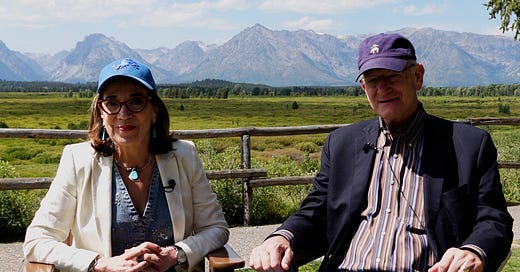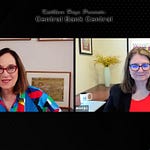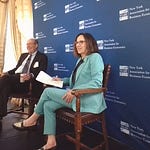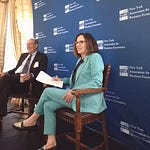Tom Hoenig has a special relationship with the Kansas City Federal Reserve Bank’s Annual Economic Symposium in Jackson, Wyoming. As president of the K.C. Fed from 1991 — the first year I attended the event and the first time I met and interviewed him - through 2011, and as the first K.C. Fed president to rise through the ranks of the organization to achieve its highest position, he has been part of the evolution of what is now a world class event that draws top Fed officials and economists in the U.S. but also central bankers from around the world.
So I ask him as we sit down to discuss the message Fed Chair Jay Powell has sent signaling a rate cut at its meeting next month, I ask him, Why is the K.C. Fed symposium so important?
”This conference was started more than 40 years ago and it’s about central banking, about monetary policy, about lessons learned, about how we might do things better in economic and monetary policy,” he says. “We have some distinguished central bankers from around the world, we have academics who have great credentials and reputation, and they come together to have a good conversation, don’t always agree, but each time we learn a little more.”
Chair Jay Powell captured the global monetary policy spotlight at this year’s symposium by delivering powerful message on that “the time has come” for the Fed to adjust policy. In other word for the central bank to start its rate cutting cycle with its first reduction at its meeting next month.
”What he was really saying is, ‘I think we’re there,” Tom says. “I think we’re very close to where we want to be, and therefore interest rate cuts are on the table.”
Tom says Powell’s nod to a September rate cut left open the question of how big - or little- that cut will be going forward and this is a concern. “The labor market has rebalanced some but we still have a very strong labor market despite these recent numbers.”
”I would caution that they be very clear that this is not one in a series, that they’re only going to move as inflation does decrease,” he advises. “Otherwise they are going to having to go back and forth more likely.”
”So they have to be careful in their messaging. They will want to make sure it’s tied to clear reductions in inflation as the economy remains strong.”
Tom is also the former vice-chair of the FDIC and as such is tuned into bigger picture issues that drive markets and impact banks, and therefore affect the broader economy and financial system. “One of the issues that was brought up (at the Symposium) that I thought was fascinating was the role of fiscal policy and what is its interaction with monetary policy is and may be as we go forward from here.”
In fact, he says how the Fed deals with inflation is key, as just ahead of them, longer term, “is a major fiscal spending problem” as the budget deficit keeps growing and the need to issue more and more bonds to finance will put increased pressures on the U.S. government bond market. Could it force the Fed at some point to start buying bonds again to prevent longer term interest rates from rising?
If these are concerns you share, and even if you don’t hear and see how Tom sees the challenges ahead for policy makers.
Thomas Hoenig was President and Chief Executive Officer of the Federal Reserve Bank of Kansas City and a member of the Federal Reserve System's Federal Open Market Committee from 1991 to 2011. Mr. Hoenig was with the Federal Reserve for 38 years, beginning as an economist and then as a senior officer in banking supervision. As President and Chief Executive Officer, he led the Federal Reserve Bank of Kansas City during the Great Recession and the banking crisis of 2008 and 2009.
Tom is now a Distinguished Senior Fellow at the Mercatus Center. He became a director of the FDIC on April 16, 2012, and served as vice chairman from November 30, 2012 to April 30, 2018.













Share this post